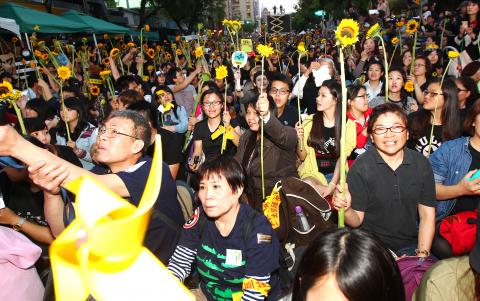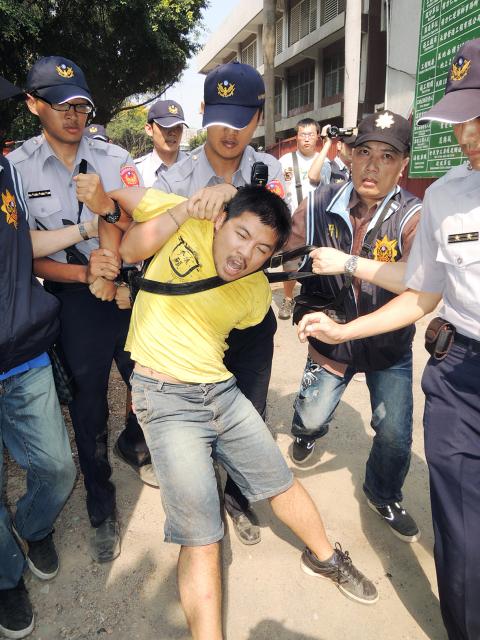When Wang Chung-ming (王鐘銘) called on the government to halt the demolition of a military veterans community in 2013, he was charged with obstructing official duties because he scuffled with police. He was found guilty and sentenced to three months in jail.
Later that same year, the Green Party activist was arrested and sentenced to another three months in jail for clashing with police during a protest against the removal of trees for a public construction project.
“I was surprised to learn that I was found guilty,” Wang said of the court’s unusual decision to jail a protester. “Nobody saw it coming.”

Photo: Chen Kuan-pei, Taipei Times
Wang’s legal problems illustrate how authorities have used the law in recent years to suppress protests. Whereas police once relied on the Assembly and Parade Act (集會遊行法) to silence dissent, today they are employing other criminal charges to regulate protests. Legal activists have raised concern over police misusing the legal system, as a growing number of protesters are arrested and charged for acts as innocuous as throwing a piece of paper at the police during demonstrations.
LAW IN TRANSITION
Under the Assembly and Parade Act, protesters require permission in advance from the police for rallies and demonstrations. However, the law, created one year after martial law was lifted in 1987, does more to infringe on human rights than protect them.

Photo: Lee Hsin-fang, Taipei Times
“Although martial law ended almost 30 years ago, authoritarian thinking has survived Taiwan’s democratization. From the police to judges, the fundamental right to peacefully assemble is still deemed to be a threat to social order,” says Kao Yung-cheng (高涌誠), a human rights attorney and advocate.
A legal case in 2009 eventually led to the Council of Grand Justices to issue Constitutional Interpretation No. 718 last March, which ruled that provisions of the act are unconstitutional.
The Supreme Court’s interpretation has had a direct impact on police and prosecutors, who now rely on sections of the Criminal Code (刑法) — illegal entry into a building, obstructing official duties, insulting a public official — in an attempt to curb demonstrations.
Chen Yu-fan (陳雨凡), deputy executive director of the Judicial Reform Foundation (民間司法改革基金會), says that these laws are being used in an arbitrary and trivial manner.
Chen cites as an example the arrest of a student who threw the sleeve of a coffee cup at police during an anti-nuclear protest last April.
“A push or a nudge can lead to arrest for obstructing public duties. It is rather absurd to think that peaceful, unarmed demonstrators can pose a threat to large numbers of police and stop them from executing their duties,” Chen says.
In the study Criminal Risk Management for Assembly and Parade (集會遊行的刑事風險管理), human rights lawyer Tsai Ya-ying (蔡雅瀅) reveals that it is not only protesters who think the laws are absurd.
“Even the police officers I interviewed think... demonstrators are punished too harshly,” Tsai says.
UNDER PROSECUTION
Human rights activists worry that criminalizing protests will likely discourage and intimidate people from participating in public demonstrations.
“Not many people can handle the pressure of being tangled in litigation for a long time. I’ve seen students unable to study abroad because they have to go to court. It definitely has a coercive effect on protesters,” says Chen.
Chen gives as an example the Sunflower movement, a mass protest that began in March 2014 to stop the legislature from passing a contentious cross-strait service trade agreement. More than 200 students and activists were indicted for occupying the main legislative chamber and sieging the Executive Yuan.
Though legal activists expect a decrease in the number of arrests when president-elect Tsai Ing-wen (蔡英文) assumes office in May, Chen says the test will be in how police deal with protesters on the ground.
Hsu Jen-shou (許仁碩), a legal specialist from the Taiwan Association for Human Rights (台灣人權促進會), agrees, adding that the police and prosecutors have their own own “bureaucratic habits.”
“We will continue to monitor the new government and see if it makes policy decisions that respect the voice of the people, and if the Tsai-led Democratic Progressive Party will amend or abolish problematic laws,” Hsu says.
Wang started his second three-month sentence last month, following his imprisonment earlier this year associated with the tree-sitting protest on campus.

Taiwan has next to no political engagement in Myanmar, either with the ruling military junta nor the dozens of armed groups who’ve in the last five years taken over around two-thirds of the nation’s territory in a sprawling, patchwork civil war. But early last month, the leader of one relatively minor Burmese revolutionary faction, General Nerdah Bomya, who is also an alleged war criminal, made a low key visit to Taipei, where he met with a member of President William Lai’s (賴清德) staff, a retired Taiwanese military official and several academics. “I feel like Taiwan is a good example of

March 2 to March 8 Gunfire rang out along the shore of the frontline island of Lieyu (烈嶼) on a foggy afternoon on March 7, 1987. By the time it was over, about 20 unarmed Vietnamese refugees — men, women, elderly and children — were dead. They were hastily buried, followed by decades of silence. Months later, opposition politicians and journalists tried to uncover what had happened, but conflicting accounts only deepened the confusion. One version suggested that government troops had mistakenly killed their own operatives attempting to return home from Vietnam. The military maintained that the

Taipei Mayor Chiang Wan-an (蔣萬安) announced last week a city policy to get businesses to reduce working hours to seven hours per day for employees with children 12 and under at home. The city promised to subsidize 80 percent of the employees’ wage loss. Taipei can do this, since the Celestial Dragon Kingdom (天龍國), as it is sardonically known to the denizens of Taiwan’s less fortunate regions, has an outsize grip on the government budget. Like most subsidies, this will likely have little effect on Taiwan’s catastrophic birth rates, though it may be a relief to the shrinking number of

Since its formation almost 15 years ago, Kaohsiung rock band Elephant Gym (大象體操) has shattered every assumption about contemporary popular music, and their story is now on screen in a documentary titled More Real Than Dreams. It’s an unlikely success story that says a lot about young people in Taiwan — and beyond. For a start, their sound is analog. In the film, guitarist Tell Chang (張凱翔) proudly says: “There is no AI in our sound.” His sister, bass player KT Chang (張凱婷) is the true frontwoman — less for her singing abilities than for her thunderous sound on the instrument. Fast like